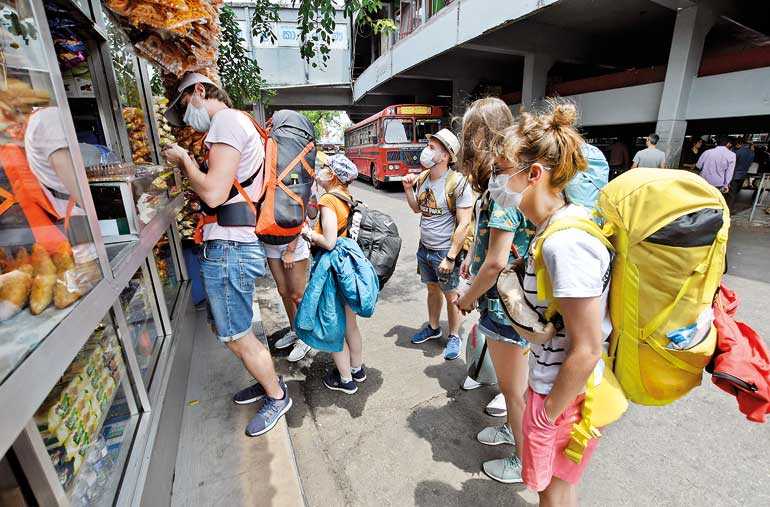Sunday Feb 22, 2026
Sunday Feb 22, 2026
Tuesday, 17 March 2020 00:04 - - {{hitsCtrl.values.hits}}

Sri Lanka’s tourism industry had almost completely recovered in December after the Easter Sunday attack last year. The leisure sector was preparing for a stronger growth in 2020 before the bad news on the novel coronavirus outbreak – Pic by Shehan Gunasekara
Positive news on anything is the most sought information these days. Whenever top businessmen and higher corporate officials call or meet, they request me to “say something positive about the economy”. Analysts and stock brokers are not exceptional.
Under the former Government led by Maithripala Sirisena, Sri Lankan citizens mainly got news that dented investor sentiment. Higher cost of living, fuel price formula, trade union protests, and the then government’s bias towards International Monetary Fund-prescribed policies were some of them. Frequent negative media publicity and social media campaigns raised  concerns over the policies of the previous government, which failed to implement social market economy as pledged in 2015 polls.
concerns over the policies of the previous government, which failed to implement social market economy as pledged in 2015 polls.
But now, the public hardly get any negative news on the economy. Even a news of Prime Minister Mahinda Rajapaksa seeking a three-year a debt moratorium from the Indian government was downplayed by most vernacular media or at least those media did not want to explain the request was made due to the country’s heavy debt burden. Only a handful knows the reality of how the officials at Sri Lanka’s Central Bank and Treasury are struggling make everything smoother including the debt repayment, economic growth, and revenue measures.
"The country last week started to gradually realise the grim reality of the economic recovery this year due to the fears of the impact of coronavirus both internationally and locally. Stock market trading was halted three times within four days last week to prevent a steep fall. The main All Share Price Index (ASPI) plummeted 4.1% last Tuesday after the world risky asset markets plunged a day before due to fresh COVID-19 threats. It also fell 3.6% on Thursday after the detection of the first Sri Lankan national with COVID-19 positive, and nearly 3% on Friday."
The country last week started to gradually realise the grim reality of the economic recovery this year due to the fears of the impact of coronavirus both internationally and locally. Stock market trading was halted three times within four days last week to prevent a steep fall. The main All Share Price Index (ASPI) plummeted 4.1% last Tuesday after the world risky asset markets plunged a day before due to fresh COVID-19 threats. It also fell 3.6% on Thursday after the detection of the first Sri Lankan national with COVID-19 positive, and nearly 3% on Friday.
This week all the schools and universities are closed. The Government declared Monday as a Public and Mercantile holiday in a response to prevent the novel coronavirus spread throughout the country. The Health Ministry has ordered to not hold any mass gathering. Religious ceremonies and sermons are shortened. Even film theatres are ordered to be closed. All these measures come in the wake of fears of a coronavirus outbreak in the country. At the time of writing, at least 28 Sri Lankans have been detected positive for the novel virus and are being treated in the country.
The business confidence gained from the election of President Gotabaya Rajapaksa is slowly eroding amid fear of economic slowdown after the COVID-19 threats and Sri Lanka’s mounting debts.
The grim reality is the outbreak of coronavirus across the world is likely to hit Sri Lanka’s key foreign revenue earners like garments, tourism, and remittances harder while easy foreign borrowing from China could be constrained as the world’s second largest economy itself is struggling with the highest fatalities from the pandemic disease.
The Middle East, which is the main job market for over half a million Sri Lankan expatriates, has seen the reality of the deadly virus. Some of the Middle Eastern countries have imposed travel restrictions and shut down their airports while the prices of crude oil, which is the main sources of income for many Gulf countries, have plunged on lower demand after the COVID-19 outbreak. This means many Sri Lankans are likely to lose jobs in the Middle East or will be forced to seek alternative jobs, perhaps at a lower wage.
Remittances or income from Sri Lankan expatriates have been the top foreign exchange earner of the country. It is also the main income of hundreds of thousands of rural Sri Lankans, who comprise the major vote base of Sri Lanka Podujana Peremuna (SLPP), the ruling party under which President Gotabaya Rajapaksa was elected in November 2019.
Reduction in remittances will compel rural Sri Lankans to look for other sources of income and agriculture is likely be the obvious beneficiary, though it is unlikely to happen overnight.
Reduction of overseas jobs mean there is an imminent need to create more jobs locally beyond politicians’ lip service. Unless Government promotes private sector-led growth, it will be compelled to expand the State sector which is already over-bloated.
The IMF has already said the global spread of the novel coronavirus has crushed hopes for stronger growth this year and would hold 2020 global output gains to their slowest pace since the 2008-2009 financial crisis.
That kind of global slowdown will result in more job losses for millions of expatriates across the globe.
Sri Lanka’s tourism industry had almost completely recovered in December after the Easter Sunday attack last year. The leisure sector was preparing for a stronger growth in 2020 before the bad news on the novel coronavirus outbreak.
Monthly tourist arrivals which were 70% down in May, the month following the Easter Sunday attacks, recovered to just 4.5% less in December compared to the same month in the previous year. The impact of the coronavirus is already seen with a 55% drop in Chinese tourist arrivals into the country. Chinese tourists ranked third in last year’s top foreign visitors list after India and the United Kingdom.
The lower number has also reflected in earnings with revenue from tourism falling 18% to $ 391 million in February from a year ago. With the State-run SriLankan Airlines cancelling as many as 36 flights per week to China and the Middle East as a response to the COVID-19 outbreak, the tourism industry will see a further dip in earnings. Since the end of the war, tourism has become the fastest-growing foreign exchange earner with related sectors like transport and food and beverage also benefitting immensely. All these sectors came back to almost normal towards the end of the last year mainly due to a surge in local tourism after the initial plunge. But this time, local tourists are also not going to visit anywhere until normality returns from the fears of COVID-19 threats. Thus, the coronavirus fear will dent tourism in the country, which could hit hotel, food and beverage, and transport sectors significantly.
This means many people who have registered in formal transport services like Uber and PickMe will feel the pinch of settling their lease dues in the face of lower business.
China is Sri Lanka’s top importer now, with 21% of our goods bought from the Far Eastern nation. The outbreak in China means many Chinese locals are unable to work in their own manufacturing plants and thus Sri Lankan importers will have look at alternative destinations. There are two risk factors associated with this: delays and higher prices.
Imports from China are considered among the cheapest in the world due to its massive production and scale of economies. Sri Lanka depends on China for raw materials for its exports like its top foreign exchange earner, garments. If Sri Lanka is not going to get imports on time, the importers will have to look at another foreign supplier and that will cause delays for sure. Furthermore, raw materials are not going to be supplied at the same price. They will be expensive. This means the price of Sri Lankan exports using Chinese raw materials will have to be revised upward to maintain sustainability. These adjustments are going to be very painful.
For instance, Sri Lanka currently imports approximately 25% of its textiles from China. Sri Lanka imported $ 218.1 million worth of cotton and $ 132.6 million worth of knitted/crocheted fabric from China in 2018.
Local media, quoting garment industry experts, have reported that some apparel manufacturers are exploring the option of halting operations for a few weeks as they may struggle to pay their workers who would go idle due to the non-availability of fabrics. This means indirect worker layoff or pay cuts are on the cards if things get worse.
The country earned a record $ 5.3 billion from apparel exports in 2019, a 5.1% growth compared to the previous year.
The Government’s financing for its infrastructure drive and other projects is not going to be easy this year. President Gotabaya Rajapaksa’s administration will have to allocate a significant amount of unplanned spending on COVID-19 threats and drought. This financing could make Government funding difficult, especially at a time when it has reduced taxes and State revenue is on the decline.
In the past, the Government led by Mahinda Rajapaksa had the blessings of Chinese finance mainly for infrastructure. When Sri Lanka was accused of war crimes and cornered internationally, it was China which backed this country financially and against facing international humiliation for human rights abuses. Though some the loans were expensive, still China came up with funding options where other countries including the West overlooked the island nation. With China itself struggling to face the ongoing coronavirus outbreak, it is unlikely to lend to Sri Lanka easily, unlike in the past.
With the Government turning down $ 480 million from the Millennium Challenge Corporation deal, other Western nations are unlikely to come up with some outright grants. So Sri Lanka will have to address its own funding constraints. But the options are limited for such financing without burdening the people or going for long-term leasing like in the Hambantota Port deal.
(The writer is former Reuters Economic Reporter for Sri Lanka. He can be reached via [email protected].)